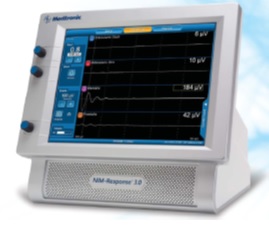Even after obtaining a detailed knowledge of the anatomy and surgical skills, motor nerves can be difficult to identify during surgery due to a disease, a previous operation, or normal anatomical variations, which can lead to a temporary or permanent damage if nerve is irritated or injured.
For e.g., During skull base surgery and various ear surgeries, the facial nerve is commonly exposed and at a risk for injury. This nerve controls all movements and expressions of the face and damaging this nerve can have devastating physical and emotional results.
Similarly, the recurrent laryngeal nerve, is one of the nerves at risk during neck dissections including thyroid surgery. Damaging this nerve can severely affect patient’s ability to speak and swallow. Intraoperative Nerve monitoring system enable the surgeon to identify, confirm and monitor nerve function to help reduce the risk of nerve damage during various procedures. Research confirms the benefits of intraoperative nerve monitoring for nerve preservation and as a risk – minimizing tool.


